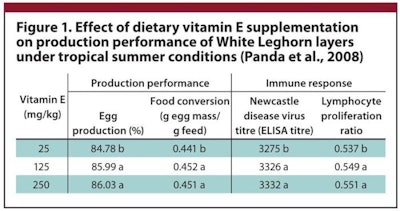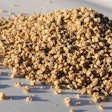
High ambient temperature is one of the most important stressors for poultry, and has a direct relationship on the profitability of meat and egg production. A seasonal problem in many parts of the world, high environmental temperatures (35-43C in tropical countries) cause economic losses through reducing feed intake and decreasing nutrient utilization, live weight gain, egg production, egg quality and feed efficiency. The ideal temperature for broilers is 10-22C for optimum body weight, and 15-27C for feed efficiency. Layers will produce eggs constantly at temperatures of 10-30C. Above 30C, performance declines in terms of growth and egg production.
The lack of sweat glands and relatively high body temperature make poultry, especially meat-type, fast-growing chickens, more susceptible to heat stress. During exposure to high ambient temperature, poultry face difficulties in maintaining body temperature. Their primary means of heat loss above upper critical temperature is by an increase in breathing rate (panting) and by raising their wings (to increase the surface area).
Under stress conditions, avian blood undergoes a change from acid base balance to alkaline balance. There is a drop in the plasma, a decreased level of vitamin C in the adrenal cortex, a reduction in lymphocytes and a depression of immune response. As the temperature rises, the birds undergo many changes – increased water consumption, respiration rate, body temperature, inferior egg quality and susceptibility to diseases.
Dietary approach
Several methods are available to alleviate the negative effects of high environmental temperatures on performance. Heat stress can be regulated by controlling the environment where the poultry are being reared, i.e. housing temperature and ventilation. However, this may not always be possible because of economic factors, and so alternative strategies must be considered. One such strategy is nutritional manipulation. Nutritional modification usually involves optimizing the diet to meet the altered needs of stressed birds.
Ambient temperature has a considerable impact on feed consumption of birds, especially adult birds, because feed intake decreases as environmental temperature increases. At temperatures above 30C, consumption decreases by 2.5-4g per degree rise in temperature. It is advisable to formulate higher density diets in order to maintain daily intake in line with requirements for growth and egg production. Reduction in dietary protein, with suitable supplementation of essential amino acids, is also a way of combating the effects of rising temperatures. Electrolyte solutions (sodium, chloride, potassium and bicarbonate) in drinking water will help replenish the bird’s electrolytes and correct the acid/base balance.
Supplementing antioxidant vitamins is also an effective way of alleviating summer stress in poultry. Antioxidant vitamins such as vitamins A (retinol), E (α tocopherol) and C (ascorbic acid) are used in poultry diets because of their anti-stress effects and also because their synthesis is reduced during heat stress. Heat stress stimulates the release of corticosterone and catecholamines and initiates lipid peroxidation in cell membranes.
It has been observed that birds stressed due to high environmental temperatures have reduced plasma ascorbic acid, α tocopherol and ascorbic acid concentrations. Heat stress also impairs absorption of these vitamins (A, E and C) and thereby increasing the dietary requirement of these vitamins. Supplementation of these vitamins at higher doses may be beneficial in overcoming heat stress related depression in performance of poultry.
Vitamin E
Vitamin E is one of the most important natural antioxidants and is an excellent biological chain-breaking antioxidant that protects cells and tissues from lipoperoxidative damage induced by free radicals. Poultry cannot synthesize vitamin E, therefore requirements must be met from dietary sources. Heat stress stimulates the release of corticosterone and catecholamines and initiates lipid peroxidation in cell membranes. It is suggested that vitamin E can reduce the negative effects of corticosterone induced by stress. Vitamin E also provides protection for those cells involved in immune responses (lymphocytes, macrophages and plasma cells) against oxidative damage and enhances proliferation and functions of these cells. Therefore, additional vitamin E supplementation in diets is necessary under heat stress conditions.
Vitamin E can be supplemented in broiler diets at 250mg/kg as a protective management practice to reduce the negative effects of stress and to result in optimum performance in broilers. In layers, vitamin E supplementation at 125-250mg/kg improves egg production, feed efficiency and immunecompetence. Heat stress depresses egg production due to lower plasma concentrations of egg yolk precursors, vitellogenin and very low density lipoprotein. Vitamin E improves egg production by facilitating the release of vitellogenin from the liver and increasing the circulating supply of this precursor for yolk formation by protecting the liver from lipid peroxidation and damage to cell membranes.
Vitamin C
Vitamin C is necessary for various biosyntheses (collagen, 1,25-dihydroxy vitamin D and adrenaline) as well as for regulation of diverse reactions (secretion of corticocosterones, regulation of body temperature and activation of immune system). It has been reported that vitamin C enhances the antioxidant activity of vitamin E by reducing the tocopheroxy radicals back to their active form of vitamin E. Adult poultry under normal conditions are able to synthesize vitamin C to meet the requirement. However, it has been reported that vitamin C requirement is higher during stress and several reports have documented a beneficial effect of supplementing poultry feed with ascorbic acid.
Supplemental dietary vitamin C limits and alleviates the metabolic sign of stress and improves performance, immunological status and the behavior of birds. Optimum response in growth, feed efficiency and/or livability in broilers under heat stress seems to occur with supplements of about 250mg vitamin C/kg feed. Laying hens have also shown responses to supplemental vitamin C at 200-400mg/kg in terms of improvement in livability, feed intake, egg production and egg quality.
Vitamin A
Vitamin A is involved in several functions of the body including vision, epithelial cell differentiation, growth and reproduction. Due to its involvement in epithelial cell differentiation, vitamin A has an effect on the immune function of birds. It has been reported that conversion of carotene to vitamin A reduces under stress. Supplemental vitamin A at 15000IU/kg and zinc (30mg/kg) improves the performance and carcass traits in broiler chickens and thus offer a potential protective management practice in preventing heat stress related depression in performance of broiler chickens. Supplementation of vitamin A at 9000IU/kg in commercial layer diets under heat stress is beneficial for optimizing laying performance and immunity.
Antioxidant vitamin combination
Combination of antioxidant vitamins may be more beneficial in overcoming heat-stress related depression in poultry performance. Overall antioxidant potential has been reported to be more efficient and crucial than single antioxidants. We have studied the combination of vitamin C (200mg/kg) and vitamin E (125mg/kg) in WL layers diet during summer stress and observed beneficial effect on production performance as well as on immune response. Vitamin A (15000IU/kg) and vitamin E (250mg/kg) has been shown to improve performance of broilers under summer stress.
High environmental temperature leads to deficiency of specific nutrients because of decline in feed intake, reduced absorption and poor utilization of vitamins. Therefore, appropriate supplemental dose of vitamins are required to sustain the performance of poultry during summer. Hence, vitamin E (125-250mg/kg), vitamin C (200-250mg/kg) and vitamin A (15000IU/kg) are recommended for alleviating summer stress in poultry.






